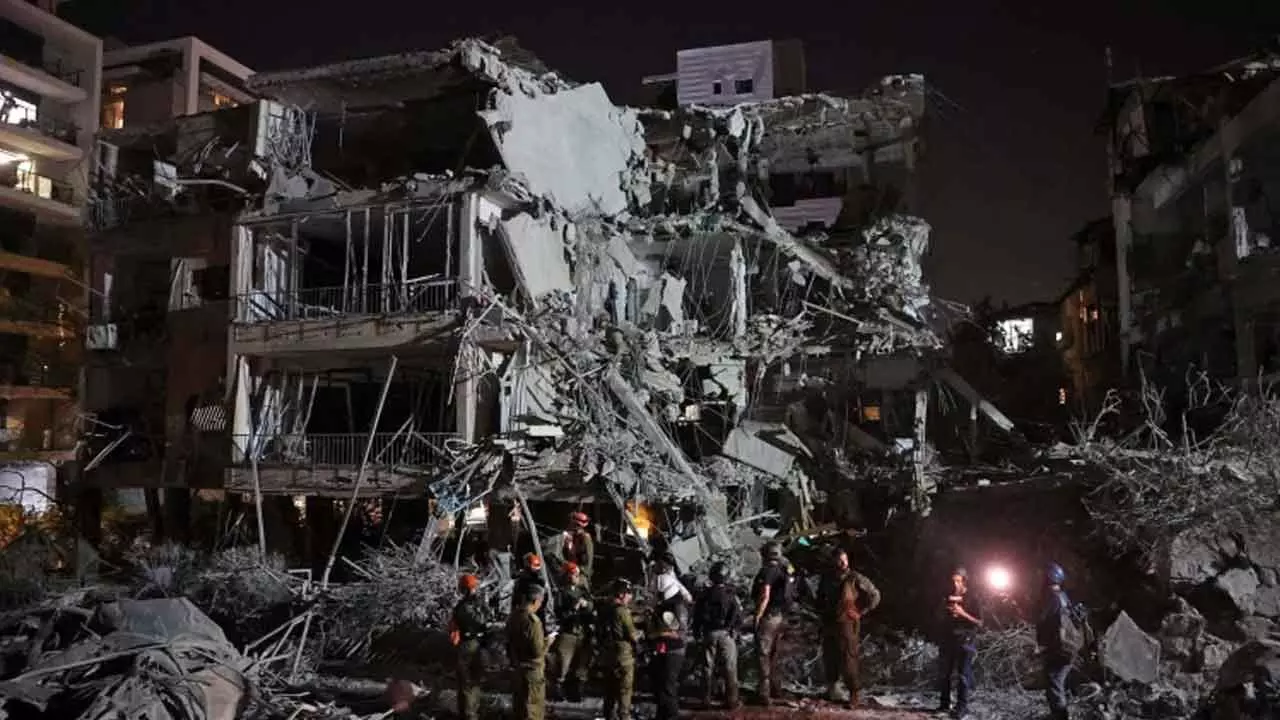Middle East on Edge: Israel's Strikes Set Back Iran's Nuclear Ambitions Amidst Escalating Conflict
Explore the intensifying Iran-Israel conflict as Israel claims a significant delay in Iran's nuclear program due to recent strikes. This article delves into the latest military exchanges, diplomatic stalemate, US involvement, and the human cost of the ongoing hostilities.
Middle East on Edge: Israel's Strikes Set Back Iran's Nuclear Ambitions Amidst Escalating Conflict

The Middle East finds itself gripped by an escalating crisis as Iran and Israel continue to trade blows, marking over a week of relentless aerial assaults. In a stark development, Israel's Foreign Minister, Gideon Saar, has revealed that his nation's concerted strikes have pushed back Iran's nuclear program by an estimated "two to three years," a claim that underscores the high stakes of the ongoing hostilities.
This pronouncement comes amidst a fresh wave of attacks on Friday, the eighth consecutive day of direct confrontation between the long-standing adversaries. Israeli fighter jets reportedly targeted critical missile infrastructure in western Iran, while Tehran retaliated with salvos of missiles aimed at the Israeli cities of Haifa and Beersheba, leaving at least 19 Israelis wounded. The human toll in Iran, according to the Human Rights Activists News Agency, is tragically mounting, with an estimated 657 deaths and over 2,000 injuries since the conflict's genesis.
Diplomacy at a Standstill Amidst Continued Violence
Even as bombs fell and missiles flew, European diplomats convened in Geneva in a desperate bid to rekindle nuclear negotiations and prevent further regional conflagration. Iranian Foreign Minister Abbas Araghchi engaged in discussions with the EU foreign policy chief and ministers from the UK, France, and Germany. However, Araghchi made it clear that direct engagement with the United States remains off the table until Israel ceases its attacks, though he signaled a willingness to continue dialogue with European counterparts.
Adding another layer of complexity to the diplomatic landscape, US President Donald Trump cast a shadow of doubt over European mediation efforts. "Iran doesn’t want to speak to Europe. They want to speak to us," Trump asserted, reiterating his earlier warning that Tehran has a mere two weeks to de-escalate or face potential American intervention. This firm stance from Washington underscores the precarious balance of power and the limited avenues for a swift resolution.
A Glimpse into the Intensifying Conflict:
Israel's "Prolonged Campaign": Israeli military chief Eyal Zamir has warned citizens to prepare for a "prolonged campaign" aimed at dismantling Iran's nuclear capabilities.
Targeted Strikes: The Israel Defense Forces (IDF) have confirmed hitting missile and nuclear-related sites across Tehran and western Iran, including an Iranian missile crew actively preparing to launch projectiles and three surface-to-surface missile launchers.
Mounting Casualties in Iran: Iranian reports indicate 657 fatalities, including civilians, from Israeli airstrikes. Iran has also accused Israel of bombing five hospitals in recent attacks.
Civilian Impact in Israel: Beyond the 19 injured in Haifa and Beersheba, Israeli authorities have, following the latest Iranian strikes, advised residents it is now safe to leave protected areas, suggesting an immediate threat has subsided.
US Citizen Evacuations: Hundreds of American citizens have reportedly departed Iran via land routes, with some facing "delays and harassment" during their exit. Disturbingly, an internal State Department cable noted that two US citizens attempting to leave Iran were allegedly detained.
Trump's Skepticism and Stance: President Trump continues to express skepticism about Europe's ability to mediate, emphasizing Iran's desire for direct talks with the US. He also publicly disagreed with his Director of National Intelligence, Tulsi Gabbard, regarding her assessment that the US believed Iran wasn't building a nuclear weapon, suggesting it would be "very hard to stop" Israel's strikes to achieve a ceasefire.
Elimination of Iranian Commanders: IDF drones successfully identified and eliminated a group of Iranian soldiers, including an Islamic Revolutionary Guard Corps (IRGC) commander responsible for at least 15 missile launchers, as they prepared for further attacks.
Regional Concerns: Arab ministers have voiced alarms about potential regional energy disruptions, urging the US to exert pressure for de-escalation.
India's Economic Resilience: Despite rising oil prices due to the conflict, India's top government adviser believes the impact on inflation will be limited for now, with Asia's third-largest economy positioned favorably to navigate global risks.
Unexpected Diplomatic Nod: In a surprising turn, Pakistan has announced its decision to formally recommend US President Donald Trump for the 2026 Nobel Peace Prize, citing his "decisive diplomatic intervention and pivotal leadership" during the recent India-Pakistan conflict.
The situation remains highly volatile, with both sides exhibiting unwavering resolve. The international community watches with bated breath, hoping for a diplomatic breakthrough before this regional conflict spirals into an even wider catastrophe.

